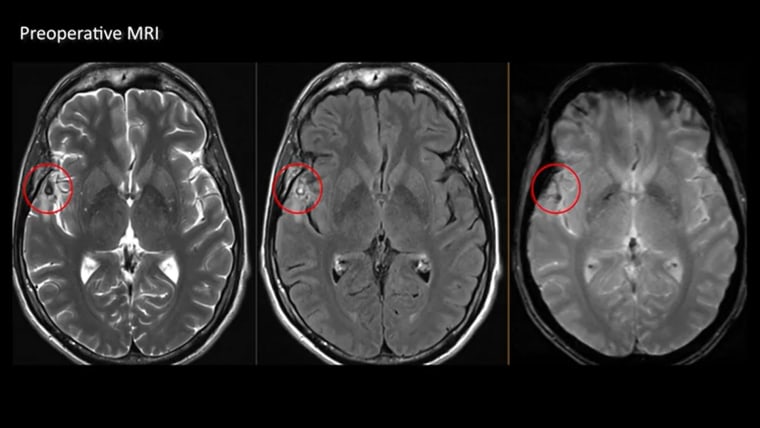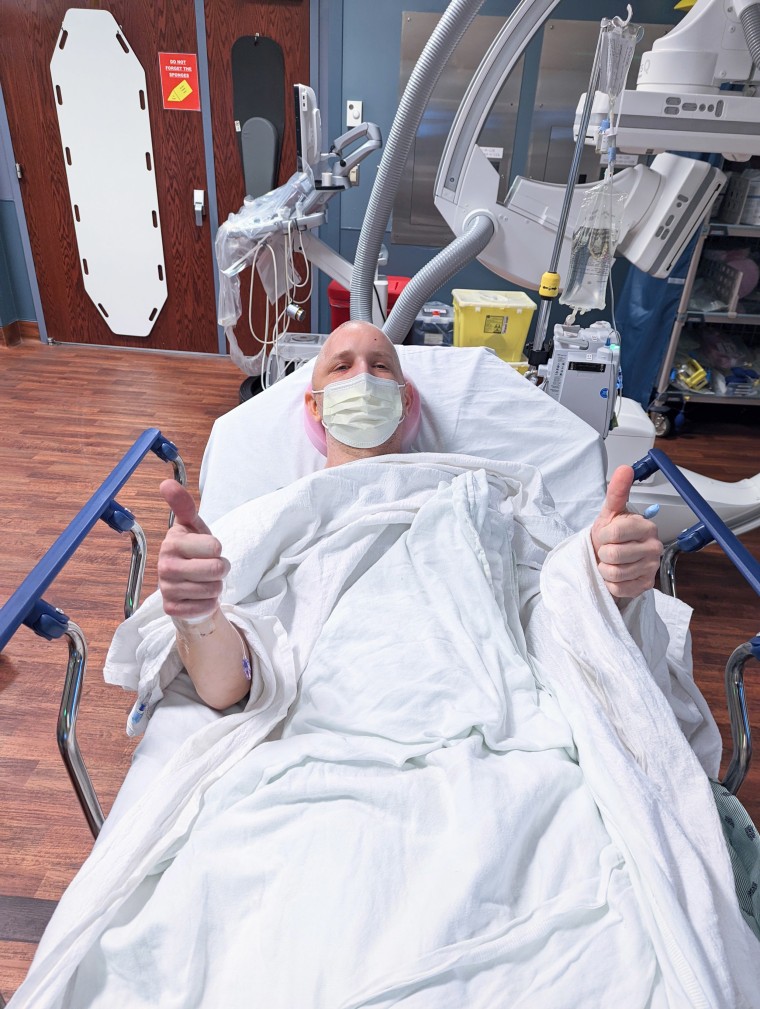The trouble started when cavity-causing bacteria all of us have in our mouths traveled to Jay Keller’s heart and then his brain, causing a life-threatening aneurysm.
But he wouldn’t know it for a while.
Keller, a 49-year old architect in Chicago, runs marathons, works out and never gets sick, he said. So when he suddenly started feeling fatigued in the summer of 2021, he thought it was just a cold. Over the next few months, the symptoms progressed from manageable to hard to endure.
“I was just increasingly tired at night,” Keller told TODAY.
“Eventually, I found that I couldn’t really run anymore. It was just too hard… my wife would say, ‘It’s like you’re 75 years old at the end of the day.’”

He went to an urgent care clinic, where doctors gave him cold medicine. It didn’t help. Keller thought perhaps he might have gotten COVID-19 without knowing it.
Then one morning, he woke up with an excruciating headache, “the worst one I ever had in my life,” he recalled. “My whole head was in extreme pain.”
It took several days for the ache to come down to a manageable level. Keller kept working and going about his everyday life, hoping the pain would go away. His annual physical was coming up so he planned to bring up the symptoms then.
When his doctor tested his blood, it led to a startling discovery.
Infection inside the heart
Keller had endocarditis, an infected heart valve, from Streptococcus mutans — bacteria that live in the mouth and cause tooth decay.
The overall incidence of infective endocarditis in the general population is low, about 15 cases per 100,000 people, said Dr. Karen Krueger, an infectious diseases specialist at Northwestern Medicine, where Keller was treated. Bacteria from the mouth or other parts of the body often enter the bloodstream, which is typically harmless, she noted.
“However, in certain instances the bacteria can overwhelm the body’s immune response or stick to certain sites like the heart valves, leading to infection,” Krueger explained.
Anyone can develop a heart valve infection, but it’s more likely in patients with a predisposing condition, such as structural or valvular heart disease.
Keller fell into that category because he was born with a bicuspid aortic valve — a congenital heart defect that meant his aortic valve, which regulates blood flow from the heart into the body’s main artery, had only two flaps instead of three.
He knew he had the heart abnormality, but it never affected his life — until the infection. He didn’t have a tooth cavity or recent dental work when it happened, but the germs were still able to reach his heart anyway.
“In this case, the bacteria probably entered the bloodstream from eating or routine dental hygiene and was able to develop an infection on Mr. Keller’s bicuspid abnormal heart valve. From there, it spread to other parts of his body through the blood stream,” Krueger said.
Infection inside the brain
The heart valve infection was just the start of Keller’s problems. The heart is the central pump of the body, so if part of that pump is infected, blood is flowing past an infected piece of machinery, said Dr. Babak Jahromi, Keller’s neurosurgeon at Northwestern Medicine.
“What that means is pieces of infected junk will just fly off and lodge anywhere,” he noted. “That had happened in Jay… one of these had lodged in his brain, infected the brain arteries.”
These infected brain arteries couldn’t maintain their integrity and formed a mycotic brain aneurysm — a dangerous bulge in an artery wall triggered by an infection. An aneurysm can rupture and bleed into the brain, causing stroke, brain damage, coma and death, according to the National Institute of Neurological Disorders and Stroke.
“It’s crazy,” Keller recalled thinking. “I’m just like, how am I alive if I have an aneurysm?”
Keller’s case was rare: Having an infected brain aneurysm is very uncommon and having that be related to a heart infection is even more so, Jahromi said.
Both issues had to be fixed, but the aneurysm had a high risk of bursting, so doctors decided it had to be treated first.
They tried a course of antibiotics to try to shrink it, but it didn’t work. So in February, Keller underwent a craniotomy, where surgeons opened his skull and performed what Jahromi called a double “brain bypass.”

Since the aneurysm involved crucial brain arteries, Jahromi and his team couldn’t simply cut it out and be done. They took the blood vessels attached to the bulge and re-routed them by attaching them to nearby normal brain arteries, Jahromi said.
“It’s basically rewiring or redoing the plumbing of the brain by cutting out the part that’s not working and getting the remaining tubes to connect to each other,” he noted.

To Keller’s great relief, he came out of the eight-hour brain surgery thinking clearly and bounced back quickly, he said.
Two months later, he was back on the operating table to have his heart valve replaced.
Today, he’s feeling “pretty much 100%” and is running and working out again. There are no restrictions on what he can do and he just needs annual follow-up visits with his medical team.
“Life is pretty much back normal, minus a couple of really cool scars,” Keller said. “I feel great.”
He urged others to listen to their bodies and not push through or ignore pain or unusual symptoms. Be more cognizant of your health and feel more comfortable going to your doctor for basic blood and urine tests that can uncover deeper problems, Keller advised. He wished he had done it sooner.

